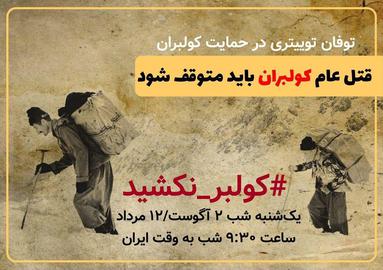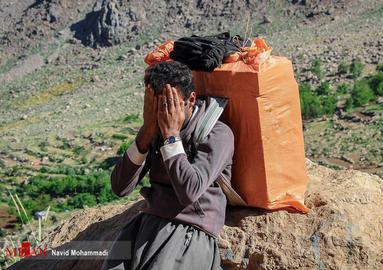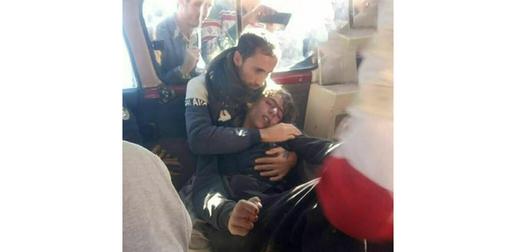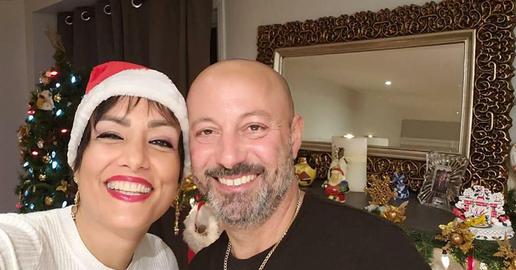On Thursday, July 30, news emerged that Vazir Mohammadi, a young Kurdish kulbar, had been killed in the Nosud border area of Kermanshah. It was shocking piece of news, though not unexpected. Anyone who follows the plight of the kulbars, the Kurdish men who carry supplies across the treacherous borderland between Iran and Iraq, knows how much they risk their lives, and for very little money. And the situation appears to be getting worse.
Human rights groups have been reporting on the kulbars and the discrimination they face for years. Ahmed Shaheed, the former United Nations Special Rapporteur on the human rights situation in Iran, outlined the harsh discrimination against them in his annual report of March 3, 2012, describing the "systematic killing of Kurdish kulbars living in the border areas of Iran.” Since then, very little has changed.
Spurred on by the huge uptake of the recent #Do_Not_Execute campaign — it became the biggest-trending hashtag for two hours at the end of July, and was used more that 10 million times on Twitter — Iranian activists came up with #Don’t_Kill_Kulbars to tell the world about the community and the discrimination it faces. The campaign took off at 9:30pm Iranian time on Sunday, August 2, and has so far been tweeted than 122,000 times, the top-trending hashtag in Iran.
At the same time, the #Do_Not_Kill_ Soukhtbars campaign was also launched. It raised awareness of the soukhtbars, people from the Baluchi ethnic group who transport goods by car or motorcycle across Iran’s border with Pakistan. Like the Kurdish kulbars, soukhtbars have been targeted by border guards, who shoot at and occasionally kill them.
There are no accurate statistics regarding soukhtbar casualties, but there is a tally for kulbars killed in recent years. In the five-year period from 2015 to 2019, a total of 368 kulbars were killed and 595 injured.
In 2019 alone, at least 76 Kurdish kulbars were killed and 176 injured. In 2018, the total was 231 people, which means the number of fatalities increased by eight percent in a matter of a year.
The same statistics reveals that 50 kulbars were killed and 144 injured after being shot by Iranian border guards, 77 percent of the people the figures analyzed. One kulbar was killed by a landmine Iranian security forces had planted, and 11 were injured and permanently disabled by mines. Seven of the 50 dead were children.
Several kulbars died from natural disasters or accidents due to the harsh terrain in 2019, including avalanches and falls from mountains. Twenty-three kulbars died from frostbite, including a child, and 19 others suffered from serious cases of frostbite. Two kulbars were killed in traffic accidents; two others were injured in the same accidents. The victims were from the provinces of West Azerbaijan, Kurdistan and Kermanshah, respectively.
The human rights organization Hengaw reported on Saturday, August 1 that six kulbars were killed and 14 others were injured in Iran in July. Of these, five were killed and 11 were wounded by Iranian border guards who had shot at them. In June, seven kulbars were killed by direct fire from Iranian border guards, and 17 others were injured.
Iranian Denial
But while these killings and injuries linked to the dangerous lives the kulbars live and the work they do continue, government officials are doing very little to improve the situation. They deal with deaths and injuries in a very selective manner, if at all. In fact, they often report misleading, inconclusive information about kulbars. If they report their deaths at all, it’s the stories of frostbite and tragic falls from mountain precipices people hear about, not the deliberate shootings by border guards.
Yet it’s not just this denial and hypocritical statements that cause problems for the kulbars. Any support for them is met with punishment. They are persecuted if they protest against how they’re treated, including if families complain about their loved ones being fired at by Iranian agents.
On July 2, a group of 10 civil activists in Baneh were sentenced to a total of 30 months in prison, 250 lashes and a fine of 250 million tomans [US$12,500]. They were punished for gathering peacefully in front of the Baneh governor's office in September 2017 to protest against the killing of kulbars by border guards. Currently, they have been released on bail, but they are expected to have to serve their sentences.
Civil society activists say that a kulbar’s job violates their human dignity, but most of the time, they have no other choice to make a living.
As the #Do_not_Kill_Kulbars campaign got underway, 80 workers' unions around the world, brought together largely through the work of the Kurdistan Human Rights Network, launched a joint statement, "Do not forget the kulbars,” demanding an end to the killing of kulbars. Together, they condemned the Iranian government's policy toward them and called on the Islamic Republic to end the killing.
visit the accountability section
In this section of Iran Wire, you can contact the officials and launch your campaign for various problems



























comments